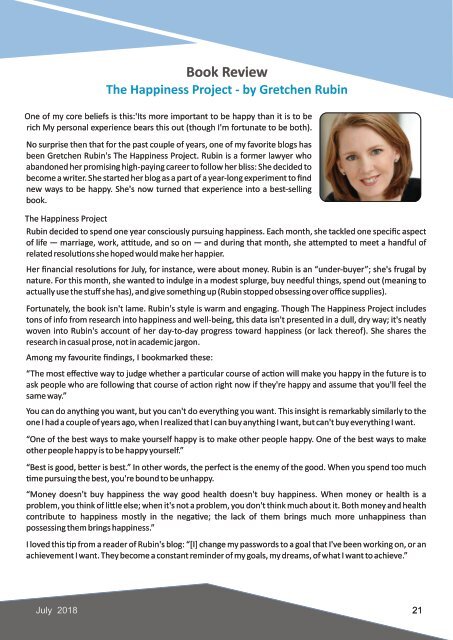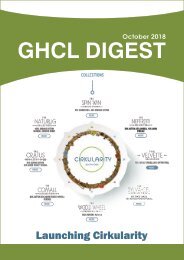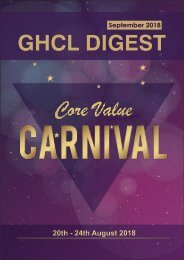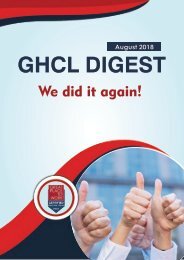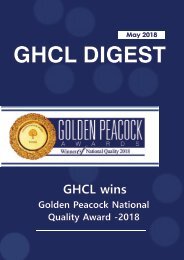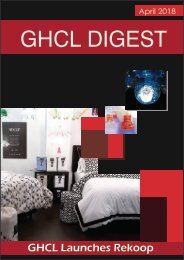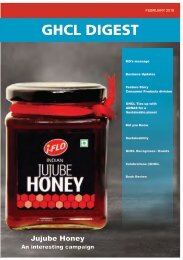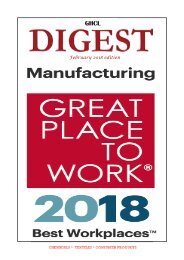GHCL Digest JULY 2018
GHCL Digest JULY 2018
GHCL Digest JULY 2018
Create successful ePaper yourself
Turn your PDF publications into a flip-book with our unique Google optimized e-Paper software.
Book Review<br />
The Happiness Project - by Gretchen Rubin<br />
One of my core beliefs is this:'Its more important to be happy than it is to be<br />
rich My personal experience bears this out (though I'm fortunate to be both).<br />
No surprise then that for the past couple of years, one of my favorite blogs has<br />
been Gretchen Rubin's The Happiness Project. Rubin is a former lawyer who<br />
abandoned her promising high-paying career to follow her bliss: She decided to<br />
become a writer. She started her blog as a part of a year-long experiment to find<br />
new ways to be happy. She's now turned that experience into a best-selling<br />
book.<br />
The Happiness Project<br />
Rubin decided to spend one year consciously pursuing happiness. Each month, she tackled one specific aspect<br />
of life — marriage, work, a tude, and so on — and during that month, she a empted to meet a handful of<br />
related resolu ons she hoped would make her happier.<br />
Her financial resolu ons for July, for instance, were about money. Rubin is an “under-buyer”; she's frugal by<br />
nature. For this month, she wanted to indulge in a modest splurge, buy needful things, spend out (meaning to<br />
actually use the stuff she has), and give something up (Rubin stopped obsessing over office supplies).<br />
Fortunately, the book isn't lame. Rubin's style is warm and engaging. Though The Happiness Project includes<br />
tons of info from research into happiness and well-being, this data isn't presented in a dull, dry way; it's neatly<br />
woven into Rubin's account of her day-to-day progress toward happiness (or lack thereof). She shares the<br />
research in casual prose, not in academic jargon.<br />
Among my favourite findings, I bookmarked these:<br />
“The most effec ve way to judge whether a par cular course of ac on will make you happy in the future is to<br />
ask people who are following that course of ac on right now if they're happy and assume that you'll feel the<br />
same way.”<br />
You can do anything you want, but you can't do everything you want. This insight is remarkably similarly to the<br />
one I had a couple of years ago, when I realized that I can buy anything I want, but can't buy everything I want.<br />
“One of the best ways to make yourself happy is to make other people happy. One of the best ways to make<br />
other people happy is to be happy yourself.”<br />
“Best is good, be er is best.” In other words, the perfect is the enemy of the good. When you spend too much<br />
me pursuing the best, you're bound to be unhappy.<br />
“Money doesn't buy happiness the way good health doesn't buy happiness. When money or health is a<br />
problem, you think of li le else; when it's not a problem, you don't think much about it. Both money and health<br />
contribute to happiness mostly in the nega ve; the lack of them brings much more unhappiness than<br />
possessing them brings happiness.”<br />
I loved this p from a reader of Rubin's blog: “[I] change my passwords to a goal that I've been working on, or an<br />
achievement I want. They become a constant reminder of my goals, my dreams, of what I want to achieve.”<br />
July <strong>2018</strong><br />
21


